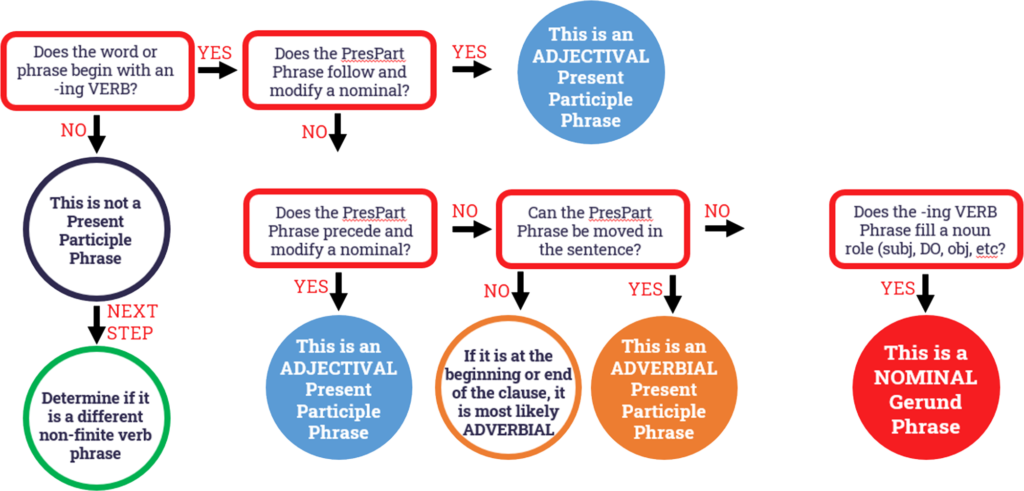chapter 3: participle phrases
A participle phrase is a adjectival or adverbial modifier that begins with a participle verb that has an -ing or -ed inflection. Remember, a participle phrase is NOT a main verb phrase if an auxiliary does not precede the participle, and the headword is the participle itself.
A present participle phrase is a verb with the [-ing] morpheme. A verb with an -ing ending at the beginning of a phrase (without an auxiliary) is the KEY MARKER for a present participle phrase. A past participle phrase is a verb with the [-en] or [-ed] morpheme. A verb with an -en or -ed ending at the beginning of a phrase (without an auxiliary) is the KEY MARKER for a past participle phrase. Each of these words can include the complements normally associated with a predicate. The important thing to remember is that the present or past participle is the first word (or headword), or it is the only word, in the phrase, which means that it is NOT preceded by an auxiliary. That is how you recognize it as a present or past participle phrase. The word has the participle inflection, but is not preceded by an auxiliary. If an auxiliary precedes the participle, then it is probably a main verb phrase.
Participle phrases are ALWAYS adverbial or adjectival.
- Using deductive reasoning, Jean voted for the best candidate. (adverbial present participle phrase)
- Jeri, her brain lost in thought, failed to hear the dog bark. (adjectival past participle phrase)
When analyzing for participle phrases, you can test whether or not it is a phrase by substituting a single adjective or adverb which supplies similar information. This substitution test can also help you determine how a participle phrase is functioning in the context of the sentence. As usual, identifying the function of participle phrases begins with proximity: who is the phrase hanging out with? A participle phrase will most often be adjectival if it is a single word and precedes a noun (or is a single word located between a determiner and a noun). A participle phrase, often of more than one word, is adjectival if it follows immediately after and modifies a nominal. And a participle phrase will most often be adverbial if it provides extra information about time or place, but the key tests for determining if a participle phrases is adverbial is always movement and deletion.
Participle phrases can modify words, phrases, clauses, or whole sentences:
- Hearing about the new assignment, the students groaned. (adverbial – can move to the end or delete)
- Those people waiting for the tour bus look excited. (adjectival – modifies PEOPLE)
- The car parked behind the radio station belongs to the station manager. (adjectival – modifies CAR)
- Known quantities are required for chemical measurement.(adjectival – modifies QUANTITIES)
- When inflated, the tires held 26 psi.(adjectival – modifies TIRES – non-restrictive)
- Considering how late it is, we ought to go home. (adverbial – can move to the end or delete)
You can use the following flowcharts to help guide your analysis:



